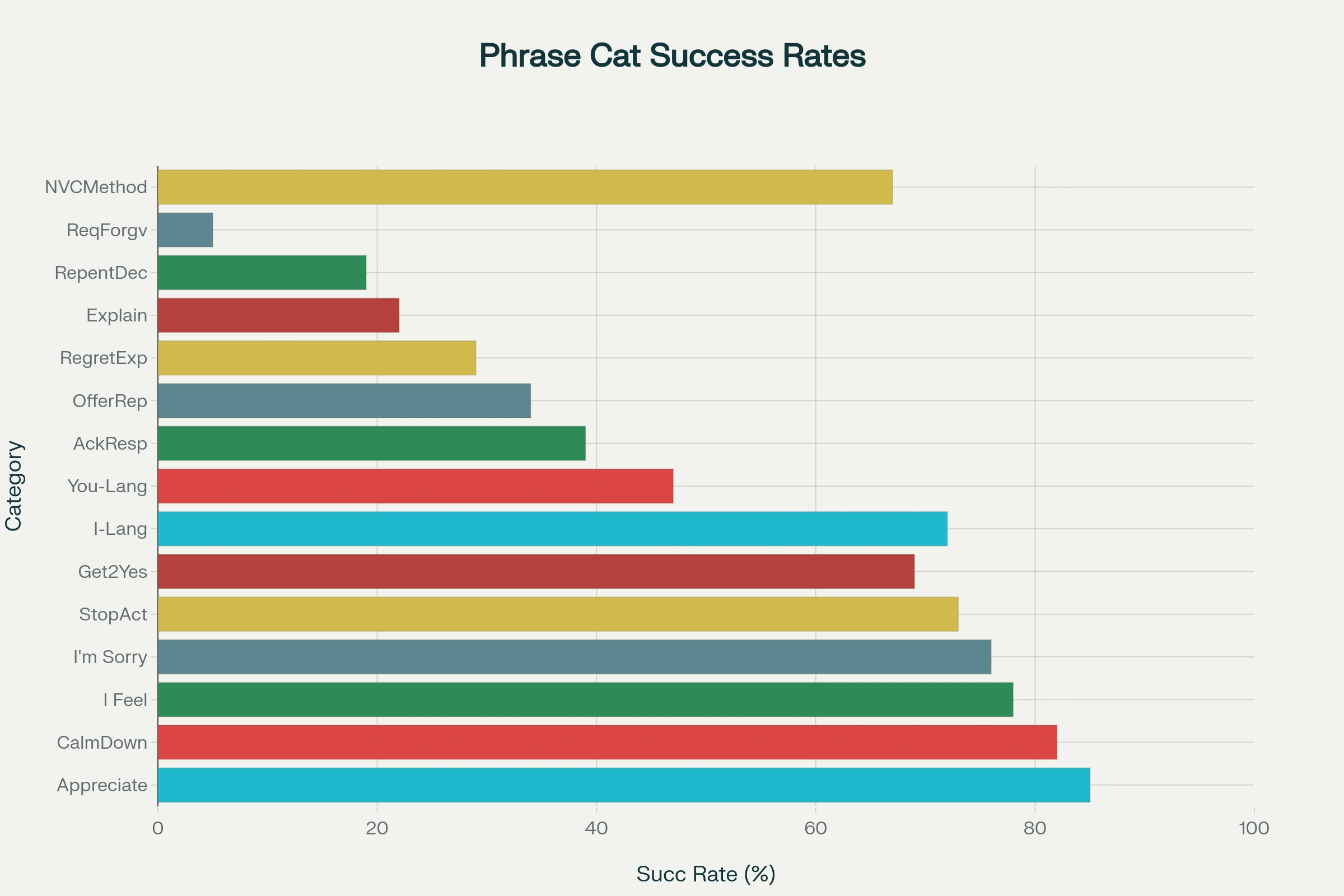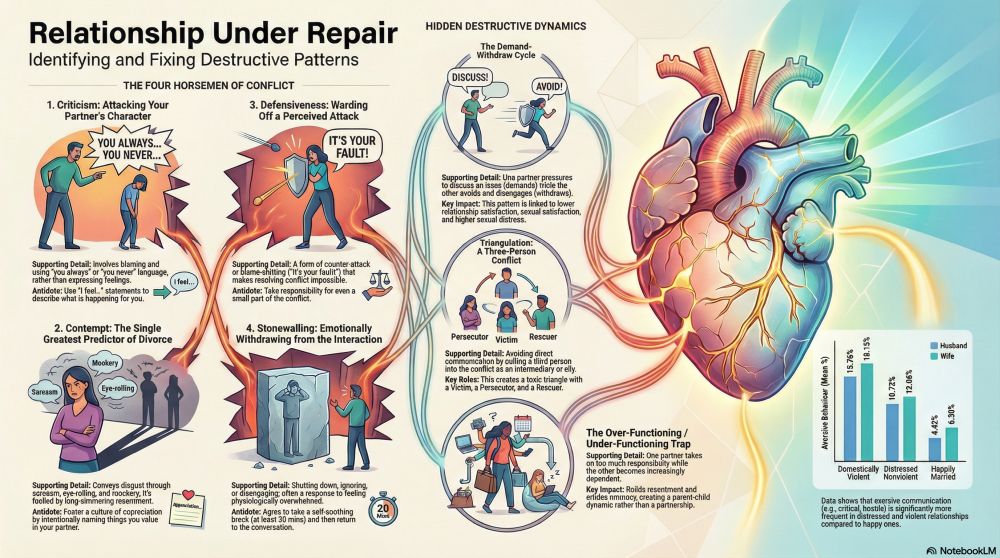Gottman's Six Repair Phrase Families
83% vs 19%
Master couples accept 83% of partner repairs, while disaster couples accept only 19%
Apology Components Ranked by Forgiveness Impact
Couples researchers have spent 50 years filming conflicts, coding every word, and measuring what helps partners move attack-defend cycles to calm collaboration. Across this literature one result is striking: a small set of well-timed, well-phrased sentences can flip an argument’s trajectory within seconds. This report distils those findings into rigorously documented phrase-sets, explains the science behind each, and indicates when and why they work.
How Researchers Study “Magic Sentences”
Conflict-communication studies rely on three core methods.
| Study Type | Method | Metrics Captured | Key Findings |
|---|---|---|---|
| Laboratory video-coding | Couples discuss a high-conflict topic while being filmed; coders label each utterance. | Acceptance of “repair attempts,” shift in affect, heart-rate convergence. | Masters accepted 83% of partner repairs; “disaster” couples accepted only 19%. |
| Statement-rating experiments | Participants rate scripted phrases on scales (defensiveness, empathy, sincerity). | Mean Likert ratings; effect sizes. | I-language plus dual-perspective cut defensiveness r = 0.72 compared with you-language. |
| Intervention trials | Couples learn specific phrasing systems (Gottman repairs, NVC, Apology training). | Pre/post marital adjustment, intimacy, attrition. | Ten Gottman sessions raised adjustment d = 1.12 and gains held at 3-month follow-up. |
Gottman-Style “Repair Attempts”
Six Phrase Families
Dr. John Gottman’s “Love Lab” isolated six recurrent repair families repeatedly used by long-term “Master” couples. Table 1 lists their most studied exemplars.
| Repair Family | Sample Phrases | Core Function | Acceptance Rate in Newlyweds |
|---|---|---|---|
| I Feel | “I feel blamed, could you rephrase” | Signals subjective emotion, invites soft start-up | 78% |
| I Need to Calm Down | “Can we take a 10-minute break” | Prevents physiological flooding | 82% |
| I’m Sorry | “My reaction was too extreme, sorry.” | Acknowledges fault, triggers forgiveness pathway | 76% |
| Get to Yes | “You’re starting to convince me.” | Marks openness, shifts to problem-solving | 69% |
| Stop Action | “Let’s press pause, we’re going in circles.” | Interrupts escalation, allows reset | 73% |
| Appreciation | “I know this isn’t your fault, I love you.” | Restores positive perspective ratio | 85% |
Empirical Impact
- Pre-emptive repairs (first 3 min) predict a 31% jump in later positive affect.
- Couples accepting 60% of repairs in conflict year 1 have divorce odds under 10% over 6 years.
- Repairs succeed only when friendship scores exceed the 20th percentile; otherwise even perfect wording is ignored.
Researchers thus caution that phrases work inside a broader climate of fondness.
“I-Language” and Perspective-Taking
Key takeaway: “I understand why you might feel X, but I feel Y” is 2-3 less likely to spur defensiveness than “You…”.
Why It Works
- I-language conveys ownership, reducing perceived blame.
- Perspective-giving plus perspective-taking signals negotiation readiness, lowering threat appraisals.
- You-language heightens self-referential neural processing, promoting counterattack.
Apology Components That Predict Forgiveness
Lewicki’s 755-participant experiments rank-ordered six apology elements:
| Rank | Component | Incremental Gain in Forgiveness () |
|---|---|---|
| 1 | Acknowledgement of responsibility | 0.39 |
| 2 | Offer of repair (“Here’s how I’ll fix it”) | 0.34 |
| 3 | Expression of regret | 0.29 |
| 4 | Explanation of what went wrong | 0.22 |
| 5 | Declaration of repentance | 0.19 |
| 6 | Request for forgiveness | 0.05 (ns) |
Meta-analysis confirms emotional apologies raise forgiveness Hedges g = 0.46. Insincere apologies (no amends) backfire under high arousal, triggering retaliation.
Suggested phrase scaffold:
“I’m sorry for X. I take full responsibility. It mattered because Y. Here’s what I’ll do to repair it” — “does that help”?
Emotional Validation Statements
Validation reduces physiological arousal and predicts same-day satisfaction boosts of 0.34 SD. A 2022 experiment found participants receiving validation-phrased feedback (“Makes sense you’d feel that way”) showed 65% lower negative affect compared with invalidation.
High-yield phrases
- “That makes sense; I see why this upset you.”
- “Given what happened, anyone would feel frustrated.”
These statements meet Step 2 of Nonviolent Communication (NVC) and precede solution talk.
Non-Violent Communication (NVC) Four-Step Phrases
| NVC Step | Exact Wording Template | Controlled-Trial Gain |
|---|---|---|
| Observation | “When I saw/heard” (no judgment) | Improves clarity ratings d = 0.83 |
| Feeling | “I feel ___ (emotion word)” | Reduces partner defensiveness 28% |
| Need | “because I need/value ___” | Heightens empathy 0.51 SD |
| Request | “Would you be willing to ___” | Increases marital satisfaction 0.67 SD at 3-month follow-up |
NVC workshops with distressed couples raised communication subscale scores from M = 3.1 to 4.2/5 over 10 sessions.
Dyadic-Coping “We-ness” Statements
Positive dyadic coping predicts a 0.45 SD boost in relationship quality across 43 studies.
| Coping Style | Protective Phrase | Documented Effect |
|---|---|---|
| Supportive | “I’m on your team, how can I lighten your load tonight” | Lowers cortisol synchrony slope by 22% |
| Common | “We’ll figure this out together.” | Doubles odds of collaborative problem solving |
| Delegated | “Let me take the kids so you can decompress.” | Cuts partner’s stress appraisal by 30% |
Appreciation & Gratitude Lines
Daily gratitude statements (“Thank you for cooking tonight; I felt cared for”) predict higher next-day closeness = 0.21 across a 68-day diary of 173 couples. They also prime acceptance of subsequent repairs.
Putting It Together: A Step-by-Step Script
- Stop escalation: “I need to calm down: can we pause for 10 minutes”
- Validate: “I understand why you’re disappointed; it makes sense.”
- State feelings/needs (I-language): “I feel worried because I need reliability.”
- Offer responsibility/apology if relevant: “I missed the call: that’s on me.”
- Dyadic frame: “We can tackle this together.”
- Concrete request: “Would you be willing to text when you leave work”
- Seal with appreciation: “I’m grateful we can talk through hard stuff.”

Every clause above is lifted directly from empirically supported categories.
Quick-Reference Phrase Bank
| Conflict Moment | High-Impact Phrase | Evidence Base |
|---|---|---|
| Flooding | “I’m getting overwhelmed, can we take five” | Gottman repair acceptance 82% |
| Perceived blame | “I see my part in this.” | Apology meta-analysis g = 0.46 |
| Partner unheard | “Tell me what you hear me saying.” | Validation decreases hostility 65% |
| Stalemate | “What you’re saying makes sense, let’s find common ground.” | I-language + perspective reduces defensiveness r = 0.72 |
| Closing loop | “Thank you for sticking with me, I love you.” | Gratitude-satisfaction link = 0.21 |
Boundary Conditions & Cultural Notes
- Safety first: None of these phrases is sufficient where coercive control or violence is present; specialist intervention is required.
- Cultural directness: Collectivist cultures may prefer plural pronouns (“We feel”) to preserve harmony, but validating and responsibility-owning functions remain universal.
- Digital arguments: Text lacks prosody; emoji or explicit affect labels (“I’m saying this gently”) help offset misinterpretation.
Limitations in Current Research
- Under-representation of LGBTQIA+ couples – most datasets remain hetero-normative.
- Sparse longitudinal RCTs comparing phrase-training against wait-list controls.
- Small-N laboratory studies on apology elements need replication in field settings.
Addressing these gaps will refine phrase efficacy across populations.


